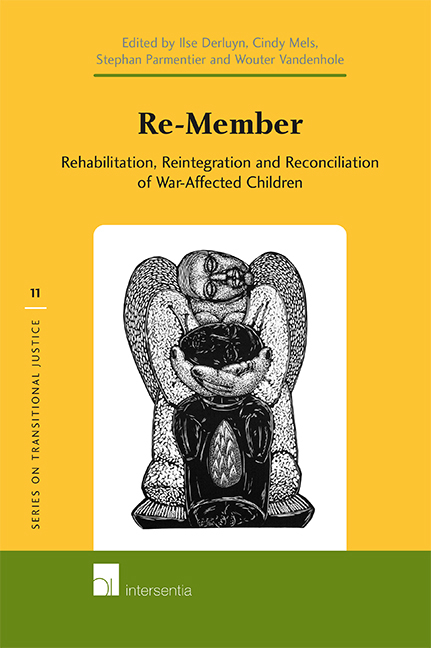Book contents
- Frontmatter
- Preface
- Foreword
- Contents
- Introduction: Children Affected by Armed Conflict at the Intersection of Three Fields of Study
- PART I SETTING THE SCENE: THREE DISCIPLINARY PERSPECTIVES
- PART II LESSONS LEARNT FROM CURRENT PRACTICES AND APPROACHES
- PART III EXPLORING RESOURCES THROUGH EMPIRICAL RESEARCH
- PART IV LOOKING BACK, REACHING FORWARD
- About the Editors
- About the Authors
18 - The Fit Between Mental Health Needs and Programming Responses for War-Affected Children in Northern Uganda
Published online by Cambridge University Press: 20 January 2021
- Frontmatter
- Preface
- Foreword
- Contents
- Introduction: Children Affected by Armed Conflict at the Intersection of Three Fields of Study
- PART I SETTING THE SCENE: THREE DISCIPLINARY PERSPECTIVES
- PART II LESSONS LEARNT FROM CURRENT PRACTICES AND APPROACHES
- PART III EXPLORING RESOURCES THROUGH EMPIRICAL RESEARCH
- PART IV LOOKING BACK, REACHING FORWARD
- About the Editors
- About the Authors
Summary
INTRODUCTION
The challenges of reintegration in post-conflict settings have been a focus of attention in Uganda, which experienced over 20 years of armed conflict between the government of Uganda and the rebel Lord's Resistance Army (LRA) that ended only five years ago. War-affected children in Uganda include not only those who were abducted by rebel forces, but all those children and adolescents who suffered – amongst other difficult experiences – internal displacement, loss of livelihood and caregivers, and disruption of infrastructure and services during the prolonged armed conflict. Several studies have highlighted the important interaction between exposure to possible traumatising experiences, available social and professional support and children's mental health in conflict settings. Simultaneously, a large number of interventions have been created in these conflict settings to tackle the possible impact of traumatising experiences on the mental health of war-affected young people.
This paper will focus on the fit between children's mental health needs on the one hand and the programming responses for children in (post-)conflict settings on the other hand by providing, firstly, an overview of child- and adolescenttraumatising experiences and their outcomes; secondly, discussing the interventions that have been used with war-affected children and adolescents to improve their mental health; and, lastly, discussing practice implications for the fit between mental health needs and feasible programming responses.
TRAUMATISING EXPERIENCES AND MENTAL HEALTH NEEDS OF WAR-AFFECTED CHILDREN IN NORTHERN UGANDA
A mental health disorder can be defined as ‘the presence of psychological distress; impairment in psychological, social, or occupational functioning; or, any disorder that is associated with an increased risk of suffering death, pain disability or loss of freedom’. Mental health problems among war-affected children have been well documented in Uganda. Most of these studies have focused on post-traumatic stress disorder (PTSD), although the prevalence rates of PTSD in these studies vary considerably, ranging from 97 to 27%.
Other mental health problems have also been documented, including depression, generalised anxiety disorders and substance abuse.
Information
- Type
- Chapter
- Information
- Re-MemberRehabilitation, Reintegration and Reconciliation of War-Affected Children, pp. 437 - 446Publisher: IntersentiaPrint publication year: 2012
Accessibility standard: Unknown
Why this information is here
This section outlines the accessibility features of this content - including support for screen readers, full keyboard navigation and high-contrast display options. This may not be relevant for you.Accessibility Information
- 1
- Cited by
